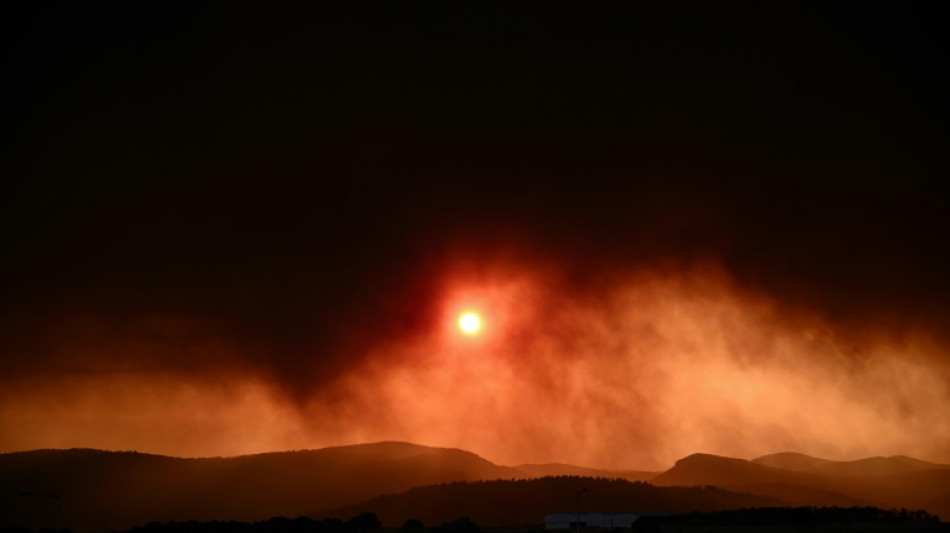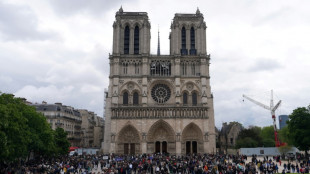
-
 Latin America fondly farewells its first pontiff
Latin America fondly farewells its first pontiff
-
'I wanted it to work': Ukrainians disappointed by Easter truce

-
 Harvard sues Trump over US federal funding cuts
Harvard sues Trump over US federal funding cuts
-
'One isn't born a saint': School nuns remember Pope Francis as a boy

-
 Battling Forest see off Spurs to boost Champions League hopes
Battling Forest see off Spurs to boost Champions League hopes
-
'I don't miss tennis' says Nadal

-
 Biles 'not so sure' about competing at Los Angeles Olympics
Biles 'not so sure' about competing at Los Angeles Olympics
-
Gang-ravaged Haiti nearing 'point of no return', UN warns

-
 US assets slump again as Trump sharpens attack on Fed chief
US assets slump again as Trump sharpens attack on Fed chief
-
Forest see off Spurs to boost Champions League hopes

-
 Trump says Pope Francis 'loved the world,' will attend funeral
Trump says Pope Francis 'loved the world,' will attend funeral
-
Oscar voters required to view all films before casting ballots

-
 Bucks' Lillard upgraded to 'questionable' for game 2 v Pacers
Bucks' Lillard upgraded to 'questionable' for game 2 v Pacers
-
Duplantis and Biles win Laureus World Sports Awards

-
 US urges curb of Google's search dominance as AI looms
US urges curb of Google's search dominance as AI looms
-
The Pope with 'two left feet' who loved the 'beautiful game'

-
 With Pope Francis death, Trump loses top moral critic
With Pope Francis death, Trump loses top moral critic
-
Mourning Americans contrast Trump approach to late Pope Francis

-
 Leeds and Burnley promoted to Premier League
Leeds and Burnley promoted to Premier League
-
Racist gunman jailed for life over US supermarket massacre

-
 Trump backs Pentagon chief despite new Signal chat scandal
Trump backs Pentagon chief despite new Signal chat scandal
-
Macron vows to step up reconstruction in cyclone-hit Mayotte

-
 Gill, Sudharsan help toppers Gujarat boss Kolkata in IPL
Gill, Sudharsan help toppers Gujarat boss Kolkata in IPL
-
Messi, San Lorenzo bid farewell to football fan Pope Francis

-
 Leeds on brink of Premier League promotion after smashing Stoke
Leeds on brink of Premier League promotion after smashing Stoke
-
In Lourdes, Catholic pilgrims mourn the 'pope of the poor'

-
 Korir wins men's Boston Marathon, Lokedi upstages Obiri
Korir wins men's Boston Marathon, Lokedi upstages Obiri
-
China's CATL launches new EV sodium battery

-
 Korir wins Boston Marathon, Lokedi upstages Obiri
Korir wins Boston Marathon, Lokedi upstages Obiri
-
Francis, a pope for the internet age

-
 Iraq's top Shiite cleric says Pope Francis sought peace
Iraq's top Shiite cleric says Pope Francis sought peace
-
Mourners flock to world's churches to grieve Pope Francis

-
 Trump says Pope Francis 'loved the world'
Trump says Pope Francis 'loved the world'
-
Sri Lanka recalls Pope Francis' compassion on Easter bombing anniversary

-
 Pope Francis inspired IOC president Bach to create refugee team
Pope Francis inspired IOC president Bach to create refugee team
-
Alexander-Arnold will be remembered for 'good things' at Liverpool: Van Dijk

-
 US VP Vance meets Indian PM Modi for tough talks on trade
US VP Vance meets Indian PM Modi for tough talks on trade
-
Pentagon chief dismisses reports he shared military info with wife

-
 15 potential successors to Pope Francis
15 potential successors to Pope Francis
-
The papabili - 15 potential successors to Pope Francis

-
 Zhao sets up all-China clash after beating 2024 world snooker finalist Jones
Zhao sets up all-China clash after beating 2024 world snooker finalist Jones
-
Ostapenko stuns Sabalenka to win Stuttgart title

-
 Argentina mourns loss of papal son
Argentina mourns loss of papal son
-
African leaders praise Pope Francis's 'legacy of compassion'

-
 Mehidy's five wickets help Bangladesh fight back in first Zimbabwe Test
Mehidy's five wickets help Bangladesh fight back in first Zimbabwe Test
-
'The voice of god': Filipinos wrestle with death of Pope Francis

-
 Prayers, disbelief in East Timor after Pope Francis death
Prayers, disbelief in East Timor after Pope Francis death
-
Real Madrid hold minute's silence as La Liga mourns Pope Francis

-
 World leaders pay tribute to Pope Francis, dead at 88
World leaders pay tribute to Pope Francis, dead at 88
-
World leaders react to the death of Pope Francis


Climate change worsening heatwaves, air quality: UN
Climate change is driving more intense and more frequent heatwaves, which in turn generate a "witch's brew" of pollutants, threatening the health of humans and other living things, the UN warned Wednesday.
The wildfire smoke recently suffocating cities from Athens to New York may be the most visible sign of air pollution brought on by heat waves.
But extreme heat can also induce a whole host of other chemical processes that are hazardous for human health, the United Nations' World Meteorological Organization said in its annual Air Quality and Climate Bulletin.
"Heatwaves worsen air quality, with knock-on effects on human health, ecosystems, agriculture and indeed our daily lives," WMO chief Petteri Taalas said in a statement.
A recent study by the Energy Policy Institute at the University of Chicago (EPIC) indicated that fine particulate air pollution from things like vehicle and industrial emissions but also sand and wildfires, is "the greatest external threat to public health" worldwide.
Taalas stressed that "climate change and air quality cannot be treated separately".
"They go hand-in-hand and must be tackled together to break this vicious cycle."
- 'More extreme' -
While Wednesday's report was based on 2022 data, Taalas cautioned that in terms of temperatures, "what we are witnessing in 2023 is even more extreme".
On Wednesday, the European Union's Copernicus Climate Change Service said the Earth had just had its hottest three months on record, with last July the hottest month ever recorded, followed by August and that 2023 was on track to become the hottest year on record.
That is bad news for air quality levels.
"Air quality and climate are interconnected because the chemical species that affect both are linked, because the substances responsible for climate change and for the degradation of air quality are often emitted by the same sources, and because changes in one inevitably cause changes in the other," WMO said.
It pointed for instance to how the combustion of fossil fuels emits carbon dioxide and nitrogen oxide into the atmosphere, which are not only heat-trapping greenhouse gases but can lead to the formation of pollutants like ozone and nitrate aerosols.
Researchers meanwhile widely agree that climate change is causing more intense and more frequent heatwaves, and that this in turn is leading to a growing risk of more severe wildfires, WMO said.
- 'Closely linked' -
"Heatwaves and wildfires are closely linked," said Lorenzo Labrador, a WMO researcher at the Global Atmosphere Watch network which compiled Wednesday's Bulletin.
"Smoke from wildfires contains a witch's brew of chemicals that affects not only air quality and health, but also damages plants, ecosystems and crops – and leads to more carbon emissions and so more greenhouse gases in the atmosphere," he said in the statement.
The 2022 data detailed in the report showed how heatwaves last year triggered wildfires in the Northwestern United States, leading to unhealthy air.
Soaring temperatures in Europe, accompanied by unusually high amounts of desert dust reaching the continent, meanwhile led to increased concentrations of both particulate matter and ground-level ozone pollution, it said.
While high-altitude, or stratospheric ozone provides humans with vital protection from harmful the ultra-violet rays of the sun, ozone close to the Earth's surface is harmful to human health.
It also reduces crop yield, with ozone-induced losses averaging 4.4-12.4 percent globally for staple food crops, and wheat and soybean losses as high as 15-30 percent in parts of India and China.
O.Krause--BTB




